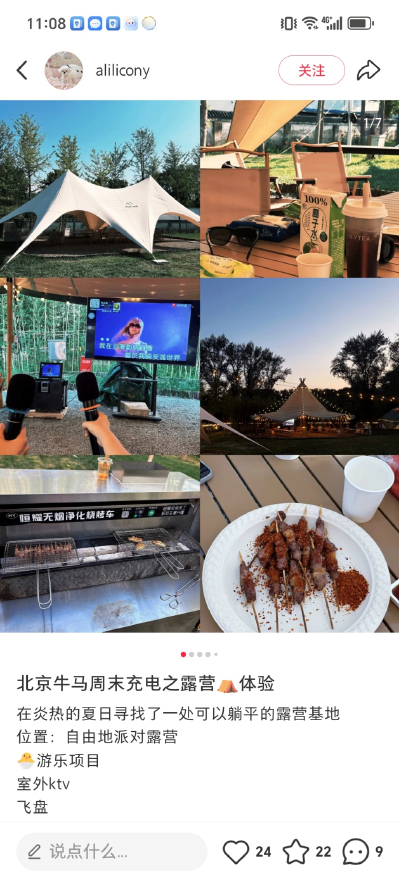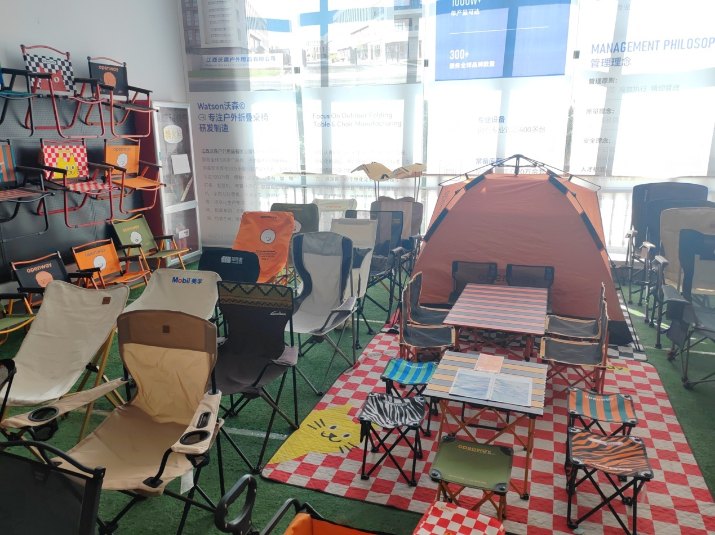| Lifestyle |
| The rise of convenient camping in urban parks | |
|
|
 A screenshot from lifestyle sharing platform RedNote recommending shared camping parks for enthusiasts (SCREENSHOT)
There was a time when the term "camping" was synonymous with journeying into the wilderness and staying away from the city. Now, on weekend afternoons, it's common to see people resting in camping chairs on urban park lawns strewn with tents.
Without the need for long trips or heavy equipment, urban camping is redefining how urban dwellers engage with nature—right in metro-accessible green spaces. There, the charm of the wild and the convenience of the city are no longer an either-or choice, but a harmonious balance that defines a new urban lifestyle. "When I bought this expensive but durable equipment about 10 years ago, my parents said I was crazy because we could never spare so many weekends to drive out of the city for camping," 25-year-old Beijing resident Chen Linjun told Beijing Review. "Now we enjoy about two to three camping nights every month in Nanyuan Forest Wetland Park in Beijing's Fengtai District, which is only a 15-minute drive from our place and home to vast grasslands." Nanyuan Forest Wetland Park is over 1,000 hectares in size and officially opened to the public in October 2021. "As an avid camper, I can confirm that a decade ago, people didn't camp out in urban parks—there weren't this many parks back then either," said Chen. "At that time, we Beijing campers would drive long hours to places in Hebei Province or Inner Mongolia Autonomous Region, where conditions were better for camping. Now, you see people camping everywhere in Beijing's parks. What used to be a niche hobby has now become a popular pastime." Catching the trend Chen's observation is corroborated by the growth of the camping economy and strategic adjustments within the camping and outdoor industries. According to data from Guangdong Province-based iiMedia Research, the size of China's camping market has shown a year-on-year upward trend. According to the company, the size of China's core camping market reached 213.97 billion yuan ($30 billion) in 2024 and was expected to reach 248.32 billion yuan ($35 billion) in 2025, a year-on-year increase of 16 percent. Camping has also spurred the consumption of other related products. The core market consists of traditional, experienced or regular camping enthusiasts, who provide a stable foundation of revenue and profit for the camping industry, like Chen. "Nowadays, camping has become a regular leisure activity for many urban families. We've adapted our products based on their needs—for instance, while still producing high-precision, advanced gear for professional outdoor enthusiasts, we've also expanded production of cute and casual products tailored for families and young people. Our most popular item in this line is a lightweight folding chair printed with emojis and cat patterns. These products are well-received not only domestically but also in Southeast Asian markets," An Jinghui, CEO of Jiangxi Watson Outdoor Products Co. Ltd, told Beijing Review. "I have great confidence in lightweight equipment. With a combination of high functionality, reasonable prices and innovative designs, they perfectly align with the consumer pursuit of a quality leisure experience." The camping economy has also spurred growth in industries such as automobiles, home appliances, food and outdoor power supplies. Sales of products related to camping activities have increased significantly. According to the iiMedia report, as the camping industry continues to develop, more specialized and diversified products will be used, further accelerating the growth of the camping industry and its associated sectors. The report shows that with technological advancements, camping consumption has exhibited a clear trend of "equipment upgrading." The traditional simple setup of a tent and sleeping bag has now evolved into more sophisticated equipment, such as a projector to create an open-air cinema, a car refrigerator to keep ingredients fresh and even smart tents capable of monitoring PM2.5 levels, for enhanced camping experiences, in line with the international trend of "glamping." "The camping industry now boasts an increasingly stable and expanding customer base, who are willing to spend more to enhance their experiences. This, in turn, motivates us to improve materials and upgrade technologies," An said.  Lightweight urban camping products designed for young people and families in a showroom of Jiangxi Watson Outdoor Products Co. Ltd. in Yingtan, Jiangxi Province, on July 10 (ZHANG YAGE)
Expanding spaces The transformation of the camping industry and shifts in camping behaviors can be partly attributed to the expansion of green spaces in Chinese cities, most notably the increase in the number of urban parks. According to data from the National Bureau of Statistics, the number of urban parks across China reached 28,000 in 2023, covering a total area of 692,000 hectares. From 2010 to 2023, the number of urban parks grew at an average annual rate of nearly 1,400, while the total park area expanded by approximately 30,000 hectares each year. By 2023, the number of parks had nearly tripled compared to 2010. "Although some camping enthusiasts still drive hours to more remote spots for solitude and fewer crowds, for many, urban parks already meet their basic needs, especially those that are large, open 24 hours and fully equipped. It's also safer than the wilderness since parks provide drinking water, restrooms and security staff," Chen noted. In cities with multiple parks, the growing enthusiasm for urban camping has stimulated a variety of new consumer models. Take Taiyuan, the capital of Shanxi Province, as an example: It is currently home to over 400 parks, including more than 30 forest parks, ranking among the top major cities in China in terms of park quantity. This gives it a unique advantage for developing the camping economy. Parks such as Jinyang Lake Park and Taiyuan Botanical Garden in Taiyuan are offering consumers more choices by organizing activities like camping plus concerts, camping plus DIY barbecues and camping plus educational experiences. These initiatives not only help increase parks' year-round operational revenue but also enrich the city's culture. "Emerging shared camping models and the management of urban park campsites are topics of significant interest within the industry. Local authorities need to put more emphasis on urban planning and space management to facilitate camping, including enhancing green space management, improving supporting facilities, diversifying services and guaranteeing health and safety. It is crucial to minimize interference between campers and daytime visitors to enhance the overall experience for all," Zhang Xiaoduan, Deputy Director of the Cushman and Wakefield Research Institute, told newspaper 21st Century Business Herald. Shared camping refers to a camping area where the land and part of the essentials, such as tents, barbecue equipment and games, are provided by the host. "Furthermore, for camping rental service providers, leasing equipment is merely the first step. Future success will depend on holistic operations, cooperation with space owners, and integrating seasonal events and thematic elements to boost the project's competitiveness," Zhang added. (Print edition title: Meadows By the Metro) Copyedited by G.P. Wilson Comments to zhangyage@cicgamericas.com |
|
||||||||||||||||||||||||||||||
|